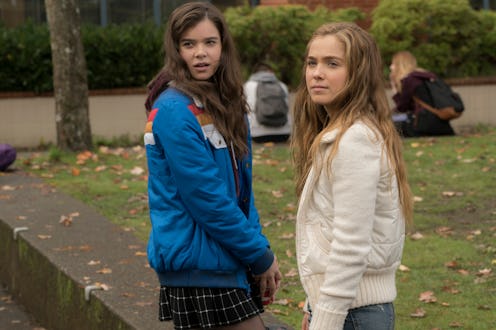
In case you haven't heard, The Edge of Seventeen is setting a pretty high bar for teen dramedies. The film, out now, stars Hailee Steinfeld as high school junior and slight misfit Nadine, who gets the shock of her life when her best (and basically only) friend, Krista (Haley Lu Richardson), starts dating her perfect older brother, Darian (Blake Jenner). It's a coming of age movie, but instead of hitting all the stereotypical plot points and staying on the surface of teen angst, the film goes where very few movies dare to go: the reality of being a teenager living with mental illness. The Edge of Seventeen normalizes depression, and other films, teen or not, should take note.
In The Edge of Seventeen , Nadine's mental health issues add depth, not drama, to the story. The fact that she is on anti-depressants is not a plot point or a conflict, just a fact of her life touched upon from time to time as the movie unravels. By taking the time to embrace Nadine's mental health problems while also not putting it front and center, The Edge of Seventeen helps normalizes a topic that's normally considered taboo, especially among teens, due to the stigma surrounding it. According to the National Institute of Mental Health, an estimated 12.5 percent of young people in the US aged 12 to 17 suffered from depression in 2015 — that corresponds to roughly 3 million teens. Nadine's struggle on-screen is simply representative of the lives of so many American teenagers today.
And more than just showing Nadine on anti-depressants, The Edge of Seventeen actually explores what dealing with depression is like, in a way that few movies dare to do. Depression, while vastly different for everyone, can come and go, with bad moments and good, just as any other illness. And Nadine certainly goes through her ups and downs. In the opening scene of the film, Nadine declares to her teacher (Woody Harrelson) that she is going to kill herself. She's not entirely committed to the idea, but her statement isn't just an overdramatic cry for attention, but her way of asking or help. The statement shapes how the audience then watches the rest of the film (which is, essentially, a flashback leading up to that first scene), so, when a few scenes later, Nadine drunkenly tells Krista that she sometimes looks at herself and hates everything she sees and is, it's not a moment of self-deprecating humor, it's heartbreaking. It's not just normal teen angst, but the sign of a very real, very treatable problem.
Nadine's emotional hardships are heightened by teenage angst, but they go beyond that. Her pain and her suffering are, thanks to that first scene, meant to be taken seriously, and not as a teenage temper tantrum. By giving Nadine the freedom to be both overdramatic and legitimately in emotional pain, The Edge of Seventeen is able to explore the nuances in its heroine's depression. The truth is, depression does not come with an on and off switch. Speaking from personal experience, depression can be a spectrum, and there are moments of in between when things can get messy. So, when Nadine tells her teacher that she is going to kill herself, it might not be with any real intent, but the pain she's feeling is very real. She's not suffering enough to be a danger to herself or to others, but she is suffering. And, as the movie makes clear, that's totally normal.
The Edge of Seventeen also shows that you don't have to be on the brink of suicide to get help for a mental illness. Moreover, if and when one does get help, there's no reason to be ashamed of it. Late in the film, Nadine tells her friend Erwin, who has a crush on her, that she just took a pill her doctor prescribed her when she was in a depression after her father died a few years ago. She's taking care of herself in a way that she knows she can, that she knows she needs, and she's completely unashamed. At this point in the film, Nadine and Erwin aren't particularly close, and it's the one and only time Nadine speaks explicitly about her mental health. The fact that it's mentioned so casually and without consequence is pretty unique for any movie, let alone one about teenagers.
With Nadine's mental health journey explored without shame, The Edge of Seventeen boldly shows how teen movies can tackle mental health in an authentic way. Now it's your move, Hollywood filmmakers, to take note and follow suit.
Images: STX Entertainment (3)